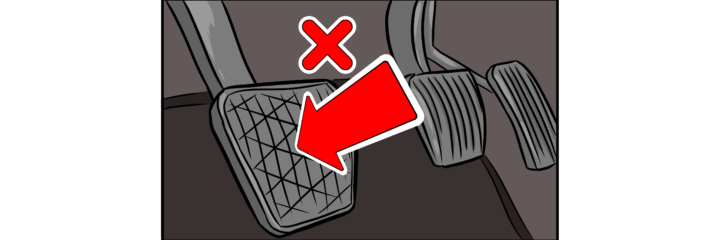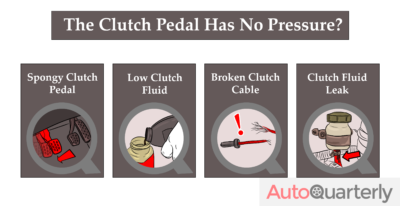The function of a clutch is to disengage the car wheels without killing the engine. In other words, it enables the engine to keep spinning without letting the wheels move.
Reasons Why the Clutch Pedal Has No Pressure
If the clutch pedal has no pressure and stops functioning normally, it could be due to several reasons like a leak in the slave cylinder, a broken clutch cable, or air in the hydraulic system of the clutch. How do you identify the source of this problem?
Read on to learn more about the causes leading to a soft clutch with no pressure and how to fix them.
Spongy Clutch Pedal
If your clutch pedal goes all the way down to the floor when you press it, you have a spongy clutch pedal. One reason for a spongy clutch pedal could be an air leak in the master/slave cylinder system. The clutch line needs to be fixed by bleeding both the clutch slave cylinder and the clutch master cylinder. Once the clutch hydraulic system is free of air, your clutch will work properly.
Low Clutch Fluid
If the quantity of fluid in the master/slave cylinders is low, it could lead to the malfunctioning of the clutch pedal. This is especially true for hydraulic clutch pedals. The clutch becomes slower or unresponsive due to the reduced hydraulic pressure. Top up the clutch fluid to the manufacturer’s recommended level to fix this problem.
Broken Clutch Cable
If the clutch cable is broken, the clutch pedal will fail to engage or disengage properly, as it loses all resistance when the pedal is pressed. Replacing the broken clutch cable is the best remedy for this issue.
The clutch pin should also be hooked in properly to the clutch master cylinder for smooth functioning of the clutch hydraulic system.
Clutch Fluid Leak
Seals on the master cylinder of a clutch hydraulic system deteriorate over time, leading to brake fluid leaks. This brake fluid, also known as the clutch fluid, could cause your pedal to go soft, makes it difficult to shift gears, and there’s no resistance when you press the clutch pedal down.
Clutch fluid could also leak from the slave cylinder or the tube that connects it to the master cylinder. Fixing this problem will require the replacement of the worn-out seals or the damaged tube. This work is best left to professionals.
Can I Get My Faulty Clutch Fixed Later?
Whether your clutch fails suddenly or gradually, fixing this problem pronto will help you avoid much bigger problems down the line. Do not drive a car with a faulty clutch. Get it fixed asap!



